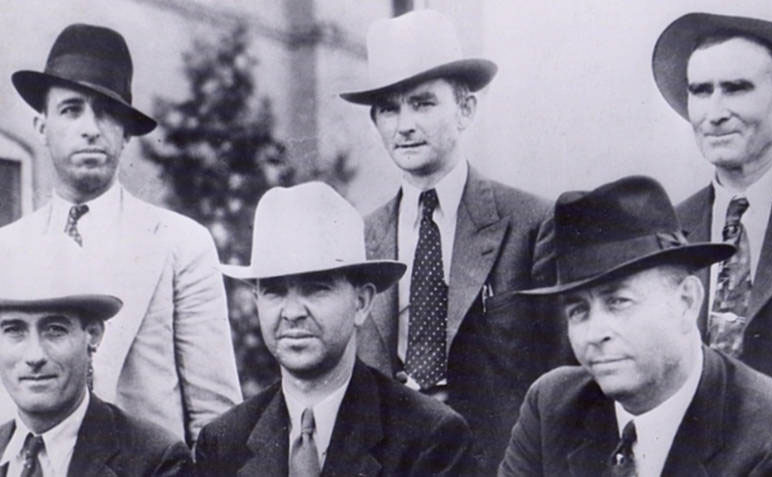(First ran in The Times and The News Star Sunday, Dec. 15, 2019.)
The ramblin’ man who wrote the screenplay for the Netfix hit movie The Highwaymen ran away from his Connecticut home at 17 after a tug-of-war with his father over the family Hammond organ.
“I wanted to play Allman Brothers,” John Fusco told me in an email this week; “he wanted me to play weddings.”
So Fusco ran to Florida, got run out by the law — a true story and maybe one day another screenplay? — and ended up in New Orleans.
Which is sort of why he wrote me last Sunday after I’d written about how much I loved The Highwaymen, the film that took him 17 years to get made; he wouldn’t rest until he gave real-life Texas Ranger Frank Hamer, the stud who tracked down Bonnie and Clyde in Bienville Parish and ended their crime spree, his due. (That effort is attached below at the bottom of this one.)
“Arthur Penn’s Bonnie and Clyde (in 1967) was a watershed film and highly influential,” Fusco wrote. “Yet, as a budding historian, I also recognize something egregiously wrong with the glorification of Parker and Barrow while demeaning (to say the least) Frank Hamer.”
I’d written the same thing. The movies tell the story from different points of view. Bonnie and Clyde is beautiful, groundbreaking for its time. The Highwaymen is much more realistic. The first is a date movie; the second asks you to engage.
My only issue with The Highwaymen was that the Bienville Parish sheriff had a heavy Cajun accent, a peculiarity that last week made my fingers type that Hollywood sure does seem to portray almost all Louisianans as Cajuns, all back yards as bayous. A lot of readers agreed, including one who was raised in Arcadia and whose mom never once cooked him jambalaya or boiled crawfish.
And another: “A guy in New York asked me do we have alligators under our houses and do we have McDonalds.”
And on like that.
Fusco, whose screenplays include Young Guns and Young Guns II and who also produces, is a TV series creator, a fiction author, and a blues musician — dude’s like a five-tool player — wanted his say on why he’d chosen to go, as he wrote, “full-out Cajun toward the end of the hunt.” Like a ballplayer in the postgame press conference or like me and you if we’re questioned on the job, he just wanted a chance to state his side. Gotta appreciate that.
“(It) was to emphasize how far out of their jurisdiction Frank and Maney (Gault, Hamer’s longtime Ranger friend) went and also to create a ‘Hero’s Journey’ mythos in the final act of the story — a crossing into the belly of the whale, a world very different from the hero’s home turf. Want to be clear that I’m not some Hollywood screenwriter who has never set foot in Louisiana and assumes that everyone hits the fais-do-do on Saturday.”
And that’s where New Orleans comes back into play in The Highwaymen. The town and that time has had a lasting influence on Fusco from when he was a young man following what he called a “mystic music map in search of the blues roots that informed the southern rock I loved so much.” He played street music, lived in boarding houses when he could, in doorways when he couldn’t.
“I love Cajun culture with a passion,” he said. “Louisiana was good to me when I was a 17-year-old runaway and wanderer (my music background was developed in New Orleans; see my recent debut album JOHN FUSCO and the X-ROAD RIDERS)…I can understand how my choice (giving a north Louisiana sheriff a Cajun accent) might have made you cringe, but I could not resist adding some exotic color and texture to a very methodical procedural in the dust of Texas.”
In reply, I’ll let the movie’s Bienville Parish sheriff speak for me here and say, “Mais Sha, let me told you somting. I’m goot wit dat.” And I am.
I asked him if he thought actor Kevin Costner was Hamer and if co-star Woody Harrelson was Gault who, like Hamer, came out of mothballs to hunt down the 1930s gangsters and ambush them on LA Hwy 54, a storyline that was a movie waiting to happen since it happened.
“100 percent,” he wrote. “It is now widely known that I had Redford and Newman attached for several years, until Paul became ill. In hindsight, the legendary tandem would have gotten in the way of the characters and the true meaning of making the film. Kevin and Woody were closer to the actual ages of the heroes, and they immersed themselves. The Hamer family sent a personal letter of gratitude to Kevin, telling him that he completely captured their ancestor (and liberated the family from 50 years of disinformation and pain).”
So everyone’s a winner. Except Bonnie and Clyde.
Fusco’s a fun follow on Twitter @JohnFusco12. Good guy. He was born up north, and he and his family have Vermont and Beverly Hills addresses today. But his soul, it just might be Cajun.
